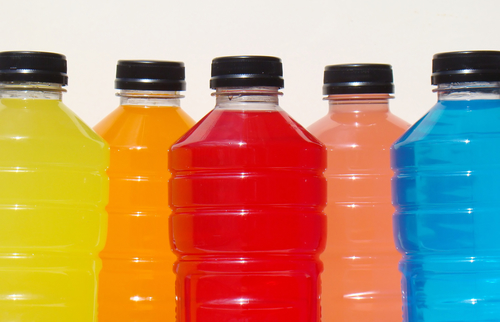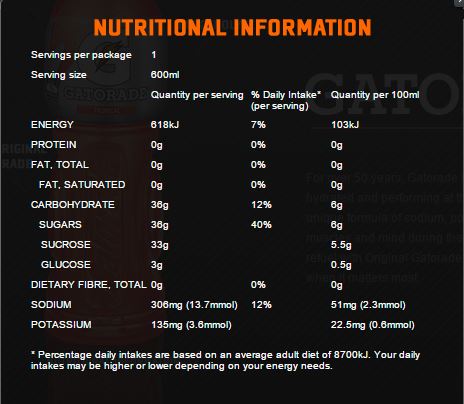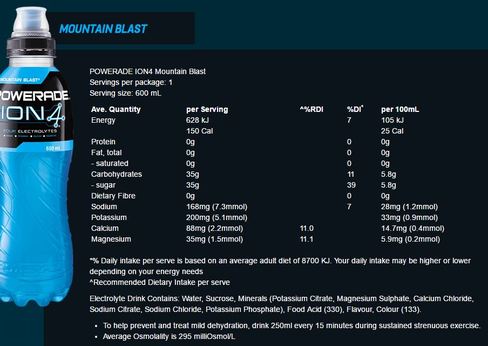Rebecca MilhamNaturopath and Nutritionist It saddens me to see kids (especially very young kids), guzzling down sports drinks because they, and their parents, are led to believe they're good for them. Our kids are bombarded with a massive amount of exposure to these drinks. Their favourite athletes drink them, they sponsor MANY teams, they have signage all over sports stadiums, and they are repeatedly used to shower other players/coaches with after games. This huge amount of exposure begins to brainwash children from a very young age. I remember when my son was about 6 he asked me for a bottle of Powerade 'Because it gives you the power to reach your goals'. That was the tag line from the Powerade ad at the time which was on constantly during the AFL games he would sit and watch. That was the first time I realised just how powerful advertising can be to young minds. So let's have a closer look at these sports drinks and see if they are really something we want our kids to be drinking........... SUGAR
First things first, let's look at the sugar content. In a 600ml there is 36 grams of sugar. That's NINE TEASPOONS of sugar. Powerade is pretty much the same at 35g. The Powerade label also gives us a a very 'useful' tip. "To help prevent and treat mild dehydration, drink 250ml every15 minutes during sustained strenuous exercise". If you were to drink 250ml every 15 minutes during a one hour sporting activity - that would be more like 60g of sugar! ADDITIVES Here's a list of additives that are listed as colouring agents in the various Powerade flavours and their potential health effects (courtesy of 'The Chemical Maze'). ALL these colours are prohibited for us in infant foods. - 102 (Tartrazine) - a synthetic colouring derived from petroleum. Any product using it in Europe must carry a health warning. Potential health effects include aggressive behaviour, insomnia, asthma, headaches, neurotoxicity, learning difficulties, skin rashes, concentration difficulties, behavioural problems. It may also be contaminated with the carcinogen - benzidine. - 104 (Quinoline Yellow) - a synthetic colouring agent that is banned in the USA, Japan and Canada. Potential health effects include asthma, behavioural issues, hyperactivity, skin ailments, hyper-sensitive reactions, learning difficulties - 110 (Sunset Yellow) - derived from petroleum. As for 102, products using 110 in Europe must carry a health warning. Potential health effects include asthma, behavioural problems, gastrointestinal ailments (eg - diarrhoea), hayfever, hyperactivity, learning difficulties, skin ailments. - 122 (Azorubine or Carmoisine) - may be derived from petroleum. Banned in the USA, Japan and Canada, and products in Europe must carry a health warning. Potential health effects include tantrums, hyperactivity, urticaria and asthma. - 133 (Brilliant Blue FCF). Petroleum derived. Potential effects include urticaria, suspected neurotoxicity, asthma, hyperactivity, allergies, gastrointestinal symptoms, rhinitis and is also a suspected carcinogen. Nice list isn't it! They're certainly not additives I want my kids consuming on a regular basis.... ELECTROLYTES But what about the electrolytes I hear you ask? Contrary to popular belief, not everyone has to replenish electrolytes with some specially made formula after exercise. Even the Powerade label tells us this (the dosages given on it's label are for sustained periods of strenuous exercise). The fact is that most people undertaking normal amounts of exercise don't need anything fancy to help them rehydrate. Besides, Gatorade and Powerade have only been around for roughly 50 years and I'm pretty sure high intensity exercise has been around slightly longer than that! People seemed to rehydrate just fine in the pre-sports drink era. But what if you're an endurance athlete, or particular sensitive to electrolyte imbalances, and you do need something extra to replenish lost electrolytes? There are plenty of good quality alternatives to these drinks available, depending on the level of activity you're undertaking and your general health. Normally I recommend powdered formulas that have better sodium:potassium ratios, plus a decent amount of magnesium and calcium (contrary to what Powerade wants you to believe, 35mg of magnesium is NOT enough to make a big difference!!) So, in a nutshell, sports drinks are basically coloured sugar water with some added sodium and potassium that, unless your child is a high intensity endurance athlete, is probably unnecessary (and even if they were there are better ways to replenish the electrolytes!). And if the sugar and additives aren't enough to discourage you, the cost of them should be! Rebecca Milham Naturopath The Natural Health and Wellness Clinic www.rebeccamilham.com.au
2 Comments
|
Archives
February 2024
Categories
All
|



 RSS Feed
RSS Feed